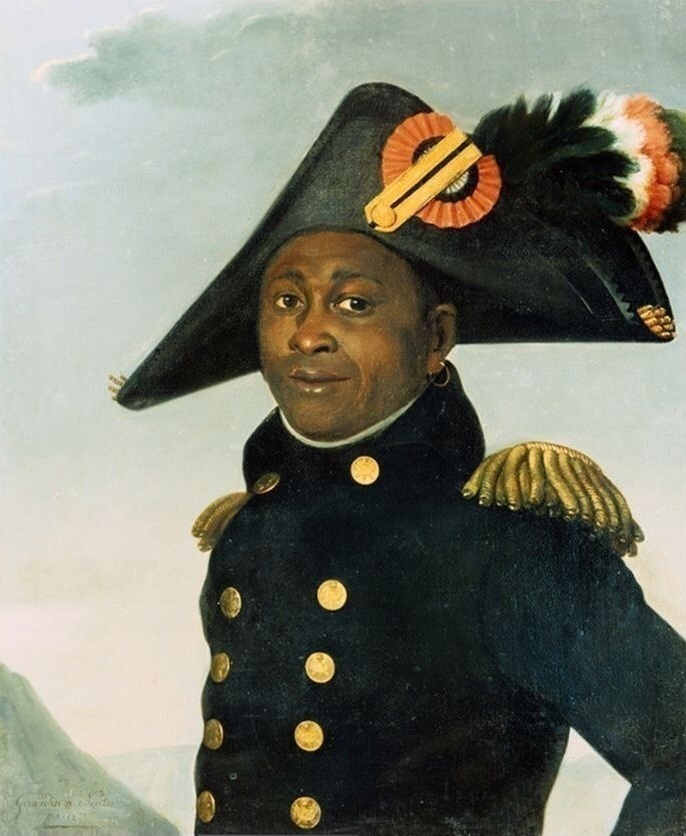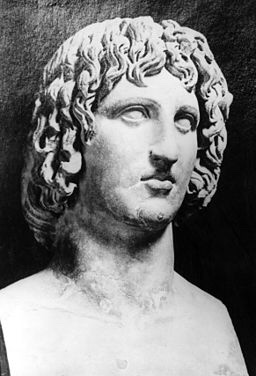A thread about the many leaders of #Haiti 🇭🇹 and their often unfortunate ends.
“For God’s sake, let us sit upon the ground
And tell sad stories of the death of kings;
How some have been deposed; some slain in war,
Some haunted by the ghosts they have deposed…”
“For God’s sake, let us sit upon the ground
And tell sad stories of the death of kings;
How some have been deposed; some slain in war,
Some haunted by the ghosts they have deposed…”
https://twitter.com/scjohnson90/status/1418018756782174212
1. Toussaint Louverture, “the only negro of unmixed blood ever to exhibit the qualities of a statesman”, “small, ugly, smart, and strong”, was a coachman who came to lead the Haitian revolution. He was abducted by Brunet in 1802 and taken to Fort de Joux, where he died in 1803. 



2. He was succeeded by Jean-Jacques #Dessalines, who proclaimed the independence of the country and named it #Haiti on Jan 1, 1804. He followed #Napoleon by declaring himself emperor in September and was assassinated two years later in October 1806. 



3. The conspirators installed Henri Christophe, a military leader of the revolution. Yet in 1811, chafing at their new constitution, he became King Henri I. He shot himself in the head with a silver bullet as the Sans-Souci Palace he’d built fell to his enemies in 1820.
#Haiti

#Haiti


4. Jean-Pierre #Boyer, a mulatto, reunited the island which had split between north and south factions, and ruled for the next 22 years. In 1843, after an earthquake, he was ousted by a revolt led by Charles Rivière-Herard, and fled to Jamaica, dying in Paris in 1850.
#Haiti
#Haiti

5. Under Rivière-Herard the more predominantly Spanish settlers in the east broke away, establishing the Dominican Republic 🇩🇴 in Feb 1844. Herard invaded and was repulsed with disastrous consequences; meanwhile a peasant revolt back in the west deposed him in May.
#Haiti

#Haiti


6. Three black army officers followed in rapid succession: Guerrier (who died in office aged 87); Pierrot (who was removed); and Riché (who reportedly OD’d on aphrodisiacs aged 66-67).
#Haiti


#Haiti



7. Faustin #Soulouque was put into power by the same mulatto Boyerist elite. He proved to be less malleable and proclaimed the Second Haitian Empire in 1849.
#Haiti
#Haiti

8. After a coup led by Fabre #Geffrard, his former duke of Tabard, Faustin I abdicated in 1859. The new President Geffrard proclaimed the Third Republic.
But civil war broke out over the Spanish reoccupation of Santo Domingo, and Geffrard and his family fled to Jamaica in 1867.
But civil war broke out over the Spanish reoccupation of Santo Domingo, and Geffrard and his family fled to Jamaica in 1867.

9. Sylvain #Salnave, who’d led the insurrection against Geffrard, was unable to consolidate power among the island’s various warring factions. The presidential palace was bombarded, he fled east, but was caught, extradited, tried for treason, and executed.
#Haiti
#Haiti

10. Five years later, Nissage #Saget became Haiti’s first ever president to serve out his term and retire voluntarily.
Congratulations Nissage!
#Haiti
Congratulations Nissage!
#Haiti

11. The army C-in-C, Gen Michel #Domingue took control, but lacking political experience preferred to lead through his relative Septimus #Rameau.
In 1876 a rumor flew that Haiti’s assets were being sent abroad. Rameau was assassinated in the street; Domingue escaped to Jamaica.

In 1876 a rumor flew that Haiti’s assets were being sent abroad. Rameau was assassinated in the street; Domingue escaped to Jamaica.


12. Pierre Théoma #Boisrond-Canal, a former senator who had been lying low in Jamaica, succeeded, but unable to negotiate between Liberal and Nationslist parties, resigned three years later, returning to Jamaica perhaps somewhat gratefully in 1879.
#Haiti
#Haiti

13. Lysius #Salomon, a member of the black elite who’d been in exile in Paris and London, returned taking power in 1879, governing against the mulattos of Port-au-Prince. They forced him out in 1888, whereupon he returned to Paris, dying at the Avenue Victor-Hugo later that year. 



14. Two presidents (Légitime and Jeune) followed while a third, Florvil #Hyppolite, consolidated power. He ruled from 1889-96 and died in office of a stroke.
#Haiti
#Haiti

15. The senate chief, Simon Sam, followed for the next six years, succeeded by the returning Boisrond-Canal as interim prez.
In 1902 General Pierre Nord #Alexis seized power in a coup d’etât. He was deposed and exiled in 1908 and is buried in St Louis Cemetery in New Orleans.

In 1902 General Pierre Nord #Alexis seized power in a coup d’etât. He was deposed and exiled in 1908 and is buried in St Louis Cemetery in New Orleans.


16. Antoine #Simon, whose daughter was a voodoo priestess, is best remembered for the funeral he held for his pet goat. He was overthrown by Cincinnatus #Laconte in 1911, who died in mysterious circumstances in 1912 when the Palais National exploded for the first time since 1869. 



17. Tancrède #Auguste was president for less than a year before dying in 1913, the possible victim of poisoning. Over the next 2 years Haiti had four more presidents, who were successively exiled, executed, overthrown and assassinated.
#Haiti
#Haiti

18. The third of these, #Théodore, had negotiated a large loan from 🇺🇸. When the fourth, Guillaume Sam, was ripped apart in the street by the mob, President Wilson sent the Marines in to “re-establish peace and order”. It was 1915, the height of the First World War.
#Haiti 🇭🇹

#Haiti 🇭🇹


19. Under the occupation of the US Marines for the next 19 years, four Haitian presidents served out their full terms, something that hasn’t happened in Haiti’s history before or since. President #Roosevelt presided over a departure ceremony at Port-au-Prince in 1934.
#Haiti 🇭🇹



#Haiti 🇭🇹




20. Sténio #Vincent, president during the 1937 #ParsleyMassacre of 1000s of Haitian labourers by Dominican soldiers, handed over to Élie #Lescot in 1941. Lescot’s mulatto-dominated government was forced out by black radical protests in Jan 1946.
#Haiti 🇭🇹
#Haiti 🇭🇹

20a. (The Parsley 🌿 Massacre was so called because French-creole speakers had a hard time with the Spanish word, ‘perejil’. The Dominicans, who resented peasant incursions across the border, would reportedly ask them to identify a sprig. Those who said it wrong were murdered.)
21. After a 7-month military government, the black Dumarsais #Estimé was elected in Aug 1946. Eventually his coalition of dissidents turned against him. The army allied with the Dominican dictator #Trujillo to force him out and he went into exile in #Paris in 1950.
#Haiti 🇭🇹

#Haiti 🇭🇹


22. General Paul #Magloire became the first president elected by universal suffrage in Oct 1950, winning 99% of the vote in army-supervised elections. Despite this overwhelming endorsement, violent rebellion forced him out in 1956 and a period of instability followed.
#Haiti 🇭🇹

#Haiti 🇭🇹


23. New elections were held in 1957. A short, mild-mannered 51-year-old doctor, François “Papa Doc” Duvalier, came to power, collecting 679,884 votes. He would rule for the next 14 years, ignoring supposed term limits and constraints on his power.
#Haiti
#PapaDoc
🇭🇹
#Haiti
#PapaDoc
🇭🇹

23a. Papa Doc’s reign of terror was assisted by the “Tontons Macoutes”, sunglass‐wearing thugs who would slit the throats of their victims, leaving them hanging for days in market places as examples of what could happen to anti-Duvalierists.
#Haiti
🇭🇹
#Haiti
🇭🇹
23b. Duvalier knew the hold of #voodoo on the Haitian imagination. He kept on good terms with the powerful houngans (priests) and bogors (sorcerers) of the island.
He even made children learn a Prayer:
“Our Doc, who art in the National Palace for life, Hallowed be Thy name…”
He even made children learn a Prayer:
“Our Doc, who art in the National Palace for life, Hallowed be Thy name…”
23c. Some say that his power stemmed in part from his cultivated resemblance to the popular voodoo bogeyman Baron Samedi.
In 1963, Duvalier had the head of his rival, Blucher Philogenes, cut off and kept in his study.
What did he say to it?
#PapaDoc
#Haiti
🇭🇹
In 1963, Duvalier had the head of his rival, Blucher Philogenes, cut off and kept in his study.
What did he say to it?
#PapaDoc
#Haiti
🇭🇹

23d. Duvalier kept the army in a state of constant flux, reducing its numbers to just 5000 loyalists.
When his favorite daughter insisted on marrying a black officer, he sent them both to Spain, then rounded up 19 of his friends and had them executed by firing squad.
#Haiti 🇭🇹
When his favorite daughter insisted on marrying a black officer, he sent them both to Spain, then rounded up 19 of his friends and had them executed by firing squad.
#Haiti 🇭🇹
24. In 1971, dying of heart disease and diabetes, he named his 19-year-old son Jean-Claude, or “Baby Doc” his successor.
After a lavish funeral mass at the presidential palace (the Vatican’s excommunication having been lifted in 1966), Baby Doc was president-for-life.
#Haiti 🇭🇹

After a lavish funeral mass at the presidential palace (the Vatican’s excommunication having been lifted in 1966), Baby Doc was president-for-life.
#Haiti 🇭🇹


25. Baby Doc remained in power for the next 15 years until forced out by protests in 1986. He flew to France on a USAF airplane but returned in 2011, dying aged 63 in 2014.
He was succeeded in government by a national council headed by General Henri Namphy.
#BabyDoc #Haiti

He was succeeded in government by a national council headed by General Henri Namphy.
#BabyDoc #Haiti


26. Elections held in Jan ’88 brought Leslie #Manigat to power, but #Namphy seized control again in a coup, suspending the new constitution. A counter-coup against Namphy was led by General Prosper #Avril in September ’88.
#Haiti
#Haiti
27. Avril fled to 🇺🇸 in March 1990. The next day Ertha Pascal-#Trouillot, a supreme court judge, became provisional president and Haiti’s first female leader.
In December Jean-Bertrand #Aristide was elected with 67% of the vote and inaugurated in Feb 1991.
#Haiti 🇭🇹

In December Jean-Bertrand #Aristide was elected with 67% of the vote and inaugurated in Feb 1991.
#Haiti 🇭🇹


28. #Aristide was a populist former priest who had been a prominent critic of the Duvaliers. The army almost immediately deposed him, but he returned in 1994 with the help of 20,000 US troops sent by Bill #Clinton. He handed over to his protégé and PM, Remi #Preval in 1996. 

29. Préval and Aristide fell out, with Aristide’s #Lavalas movement opposing Préval’s planned economic reforms. Aristide returned to power in 2001 but a violent rebellion in the north deposed him in 2004. He claimed he had been kidnapped by US special forces.
#Haiti 🇭🇹
#Haiti 🇭🇹

30. After an interim gov’t led by Boniface #Alexandre, Préval returned in 2006, dealing with riots in 2008 and the earthquake in 2010, which wrecked the Palais National.
He didn’t run in the 2011 election, which was won by the opposition’s Michel Martelly, a former musician.

He didn’t run in the 2011 election, which was won by the opposition’s Michel Martelly, a former musician.


31. Michel (“Sweet Micky”) nominated #Moïse as his successor, but the 2015 elections were disputed and he didn’t take office until Feb 2017. A north-eastern black, he felt looked down on by the elite: “The people who come from Port-au-Prince, they think they know everything.” 

32. On 7 July 2021 a gang of gunmen broke into Moïse’s residence above Port-au-Prince and shot him dead, leaving the country in a state of chaos once again.
PM Claude #Joseph stepped aside to allow Ariel #Henry to become acting president, pending new elections.
/Fin
🇭🇹 🙏
PM Claude #Joseph stepped aside to allow Ariel #Henry to become acting president, pending new elections.
/Fin
🇭🇹 🙏

• • •
Missing some Tweet in this thread? You can try to
force a refresh
















